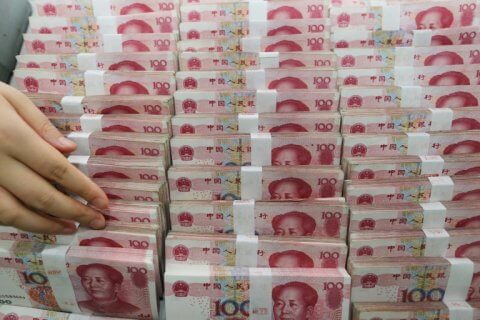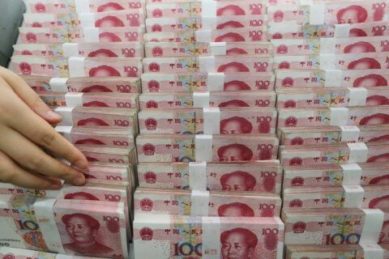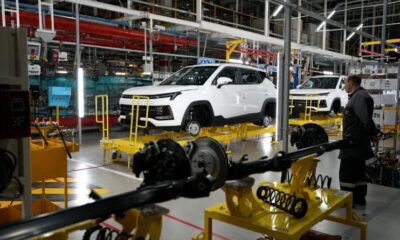Global Issues
Concerns about China’s economy and Africa -By Charles Onunaiju


In recent times, there have been concerns about the current state of China’s economy. This is understandable, given that she is not only the world’s second largest economy, but “has been the most stable contributor to world economic growth”, according to the London-based The Economist Magazine. Last August, China’s stock markets wobbled, triggering panic that raised concerns.
Shanghai stock market stumbled by about 40% and commodity prices across the world plummeted to an all-time low. Oil prices dipped to their lowest level in six and a half years. This shift reflects the actual strength and resilience of the Chinese economy, something President Xi Jinping described in his highly pivotal policy speech in the United States of America as “only a problem in the course of progress”. He had assured that the “Chinese economy is still operating within proper range”, even as he acknowledged that the general problems of the global economy has meant that “our economy is also under downward pressure”.
Premier Li Keqiang expressed similar sentiments when he addressed the 9th summer Davos Forum on September 11 and pointed out that “there have been some ups and downs, but the underlying trend remains positive”.
It is, however, to be expected that after a high speed growth for more than a quarter of a century, the Chinese economy is cooling down, but actually, far from the hard landing that scaremongers have touched off. Even with the slowdown, the economy grew at 7% in the first half of the year, by far outstripping any other major economy.
China’s share market that went into a tailspin last August triggered concerns but such worries were obviously overblown, even as government’s efforts to purchase shares worth over one hundred billion US Dollars did not end the pressure in the stock market. But, the fact is that the stock market zigzags barely reflect the overall picture of the economy, as the stocks and economic fundamentals have very little in common. According to a key watcher of Chinese economy, “when share prices nearly tripled in the year to June, they no more reflect a stunning improvement in China’s growth than their collapse since then has foreshadowed a sudden deterioration”.
Less than a fifth of China’s domestic household savings is invested in the stock market, therefore the boom of the bourse would do little to drive consumption and the crash would not dampen consumption In fact, the property market is more engaged in the Chinese economy than equities. Housing and land take larger shares of the collateral in the financial system and decisively affect growth.
The perception that a slowdown in industrial output is a key indicator of steep decline overlooks the major transformation and readjustment of the economy. This view ignores the fact that the service sector which now accounts for a larger share of the national output than industry is growing at a stellar pace and very quickly too. Demands remain strong and high. Premier Li Keqiang captured this trend more succinctly in his Davos speech when he noted that “China’s economic structure is rapidly improving. Service sector already accounts for half of China’s GDP, and consumption contributes 60% to growth. Growth in high-tech industries is notably higher than the entire industrial sector. Consumer demands for information, cultural, health and tourism products are booming”. Explaining the huge structural transformation of the economy, he declared that the Chinese economy is in a state of a new normal. It is going through a transition with traditional drivers being replaced by new ones.
The extensive model of growth in the manufacturing sector is giving way to more intensive production. And over-reliance on investment is abandoned for greater balance between consumption and investment. This is a painful and challenging process. Ups and downs in growth are hardly avoidable, as they are natural in a period of adjustment and transition”. The content of the adjustment and transition process are a new type of industrialization, I.T .application, urbanization and agricultural modernization geared towards generating strong domestic demand. The transformational content of the steady growth of Chinese economy has not merely rested on abstract statistics and figures but has been felt in the quality and living standards of the Chinese people. Premier Li addressed this point adequately when he pointed out that “for us to measure the state of the economy, it’s always important to know how the people are feeling”.
In the first six months of the year, the Chinese government has met 72% of its target of creating 10 million urban jobs by putting into gainful employment 7.18 million Chinese. Household disposal income has grown faster than the economy, with incomes of rural residents outpacing their urban resident counterparts. This simply translates to the fact that consumers have more money in their pockets. Price levels have remained stable and total retail sales have jumped by about 10%. These key indicators: rising incomes, stable prices and strong demand define a healthier economy than GDP growth and even a cooling down of GDP growth rate would be within rational economic realm as far as socially-sensitive economic indicators are in proper shape.However, even with weak global economic recovery, China’s growth trajectory has been reasonably impressive and has made a contribution of about 30% to world growth in the first half of the year. Nonetheless, with the sharp drop in commodities prices in the world market, the growth of China’s foreign trade is slowing down. But even in this regard, the actual amount of commodities China imported went up. However, China has made the point that it would “adopt a more proactive import policy and place greater emphasis on the quality of imports and exports”. This means that key commodity producers, mainly in Africa, would have to brace up to the challenges of improving quality and diversifying from over-dependence on a single commodity.
Nigeria, which has over the years relied on a single commodity will have to radically shock herself out of complacency. Nigeria could seize the advantage of being China’s largest export market, third largest partner and major investment destination in Africa, to re-orient the patterns of economic co-operation. China has proposed a global co-operation on production capacity, with countries at different stages of development with the aim to help countries overcome the difficulties in industrial development and upgrade the industries.
-Onunaiju is Director, Centre for China Studies Utako, Abuja.




















